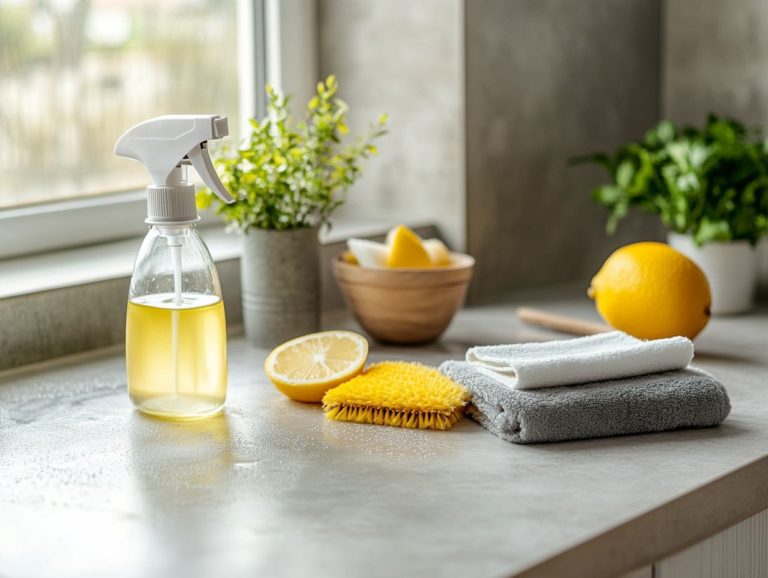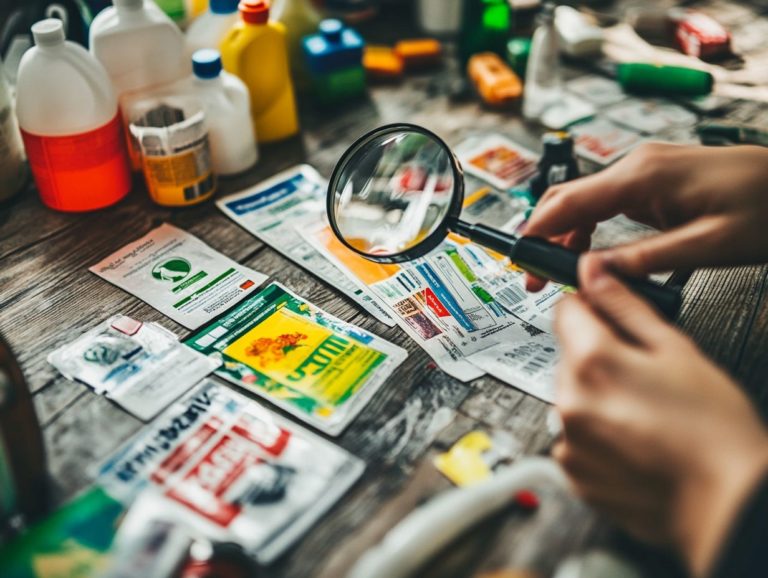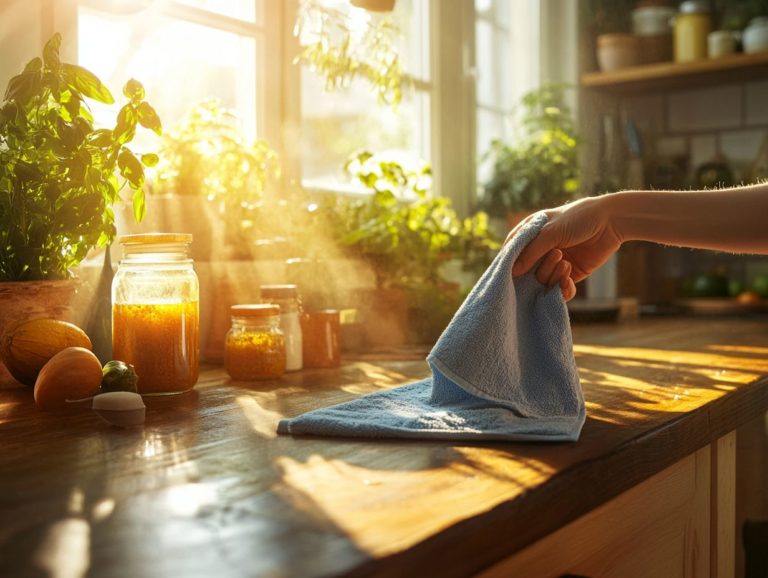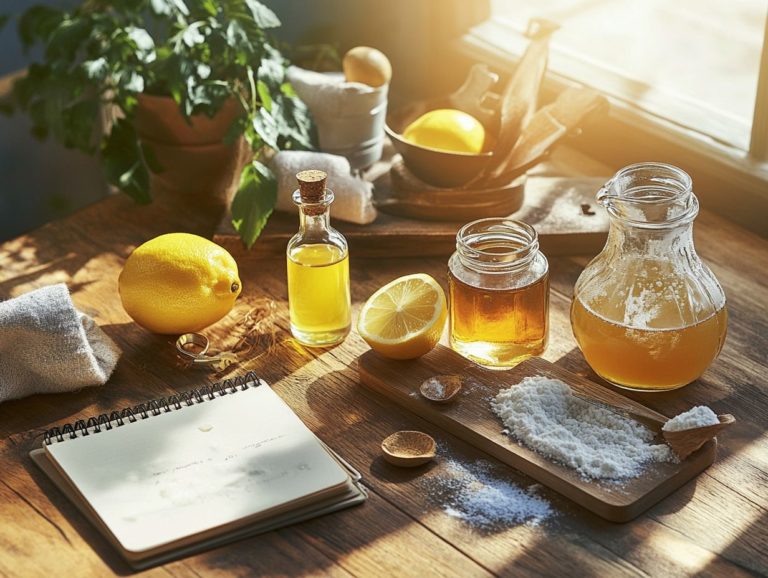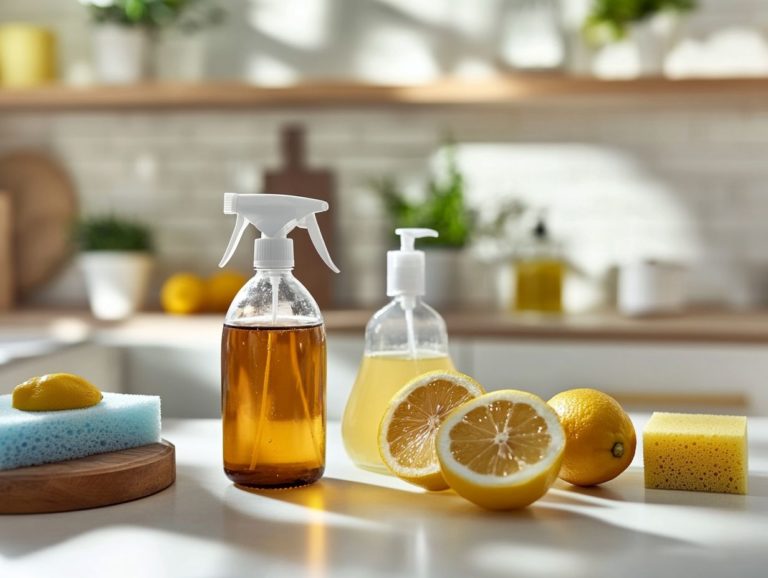What Are the Myths About DIY Cleaning?
DIY cleaning is becoming increasingly popular as you search for cost-effective, eco-friendly alternatives to commercial products.
This exploration will illuminate the numerous benefits of DIY cleaning. You will gain control over the ingredients used and significantly reduce your environmental impact.
Additionally, it tackles common myths that might dissuade you from adopting this approach, including misconceptions about its effectiveness and safety.
By the end of this journey, you will have a clear understanding of the advantages of crafting your own cleaning solutions and learn how to create them effectively.
Contents
- Key Takeaways:
- What Is DIY Cleaning?
- Why Do People Prefer DIY Cleaning?
- What Are The Common Myths About DIY Cleaning?
- What Are The Benefits Of DIY Cleaning?
- 4. Reduce Waste
- How To Create Effective DIY Cleaning Products?
- 2. Follow Recipes with Green Products
- 3. Store Properly
- 4. Test On Small Area First
- Frequently Asked Questions
Key Takeaways:
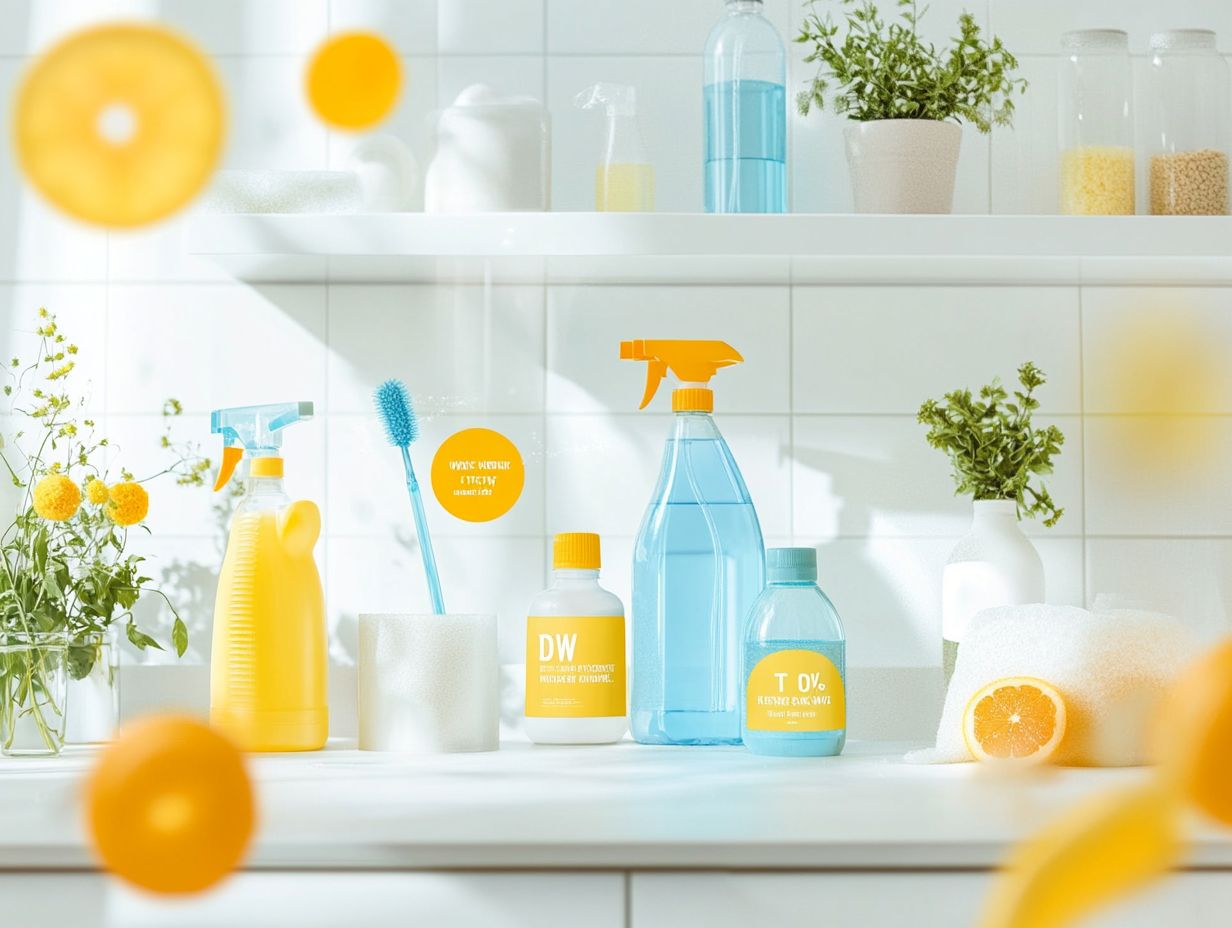
- DIY cleaning is a cost-effective and environmentally friendly option, giving you control over ingredients like hydrogen peroxide, essential oils, and Castile soap.
- There are common myths, including that DIY cleaning is not effective, time-consuming, unsafe, and only for small messes.
- DIY cleaning has many benefits such as avoiding harsh chemicals, personalizing products, saving money, and reducing waste by opting for natural cleaning alternatives like vinegar and baking soda.
What Is DIY Cleaning?
DIY cleaning is the art of crafting your own cleaning solutions, steering clear of commercial cleaners that often come loaded with harsh chemicals. By using natural ingredients like vinegar and baking soda, you can create a healthier environment that s also budget-friendly and eco-conscious. For example, vinegar cleans effectively without leaving harmful residues.
The beauty of DIY cleaning lies in its simplicity; you can whip up a range of effective solutions using everyday household staples like hydrogen peroxide and Castile soap. This makes your cleaning routine efficient and safe for your family and pets.
Experts like Carolyn Fort from the Good Housekeeping Institute say that many of these homemade methods can rival the effectiveness of traditional commercial products offered by companies like Kings Cleaning Co. For instance, Carolyn Fort mentioned that using vinegar and baking soda can be just as effective as commercial cleaners.
Why Do People Prefer DIY Cleaning?
People everywhere are jumping on the DIY cleaning bandwagon! The benefits are clear it’s cost-effective, safe, and good for our planet.
Unlike commercial cleaners that often harbor harmful substances, DIY cleaning enables you to craft your own effective solutions using natural ingredients like vinegar and baking soda, ensuring safety for both your family and pets. For example, vinegar cleans surfaces without the need for more detergent, and baking soda acts as a great sink deodorizer.
This trend is further strengthened by the increasing awareness of green products and the harmful effects of harsh chemicals in conventional cleaning supplies, leading many to embrace more sustainable cleaning methods and all green alternatives.
Start your DIY cleaning journey today! Experience the joy of a cleaner home while caring for our planet.
1. Cost-Effective
One of the main reasons you might choose DIY cleaning is its remarkable cost-effectiveness. Crafting your own cleaning solutions at home is often significantly cheaper than spending money on store-bought products. Everyday ingredients like baking soda and vinegar deliver impressive cleaning results and help you save money. This enables you to allocate your resources more wisely. With DIY methods, you can whip up a variety of cleaning solutions that rival the power of premium brands while keeping your budget firmly intact.
For example, a standard bottle of commercial all-purpose cleaner can easily set you back five dollars or more. In contrast, a simple mix of vinegar and water can be prepared for less than a dollar. Tackling tough stains and odors with baking soda is a fraction of the cost compared to those specialty stain removers that often come with sky-high price tags.
By utilizing the cleaning capabilities of these common household items, you not only cut down on your expenses but also reduce waste and minimize your reliance on chemical-laden products. This approach creates a healthier home and empowers you to take control of your cleaning processes, promoting sustainable practices that benefit both your wallet and the planet. Using newspapers for cleaning windows is another cost-effective and sustainable method.
2. Control Over Ingredients
One compelling reason you might prefer DIY cleaning is the control it gives you over the ingredients in your cleaning products. You can choose safe, environmentally friendly components like vinegar, essential oils, and Castile soap (a natural soap made from vegetable oils), steering clear of the harmful chemicals often lurking in commercial cleaners. This level of control ensures the safety of your family and pets and resonates with a growing trend toward sustainable living and the adoption of green products in your home. Products equally effective can be made using these natural ingredients.
By selecting natural ingredients, you can harness the antibacterial properties of tea tree oil, effectively battling germs without the harshness of synthetic alternatives. Baking soda serves as a gentle abrasive and deodorizer, making it perfect for scrubbing surfaces without causing damage. Coffee grounds also serve as a natural deodorizer, and hairspray can remove ink stains and polish wood surfaces.
As you become more aware of how your choices impact both your health and the environment, embracing DIY cleaning solutions transitions from a mere trend to a lifestyle commitment. Focusing on ingredient control fosters mindfulness and aligns your cleaning habits with a more holistic, eco-conscious approach. Imagine transforming your cleaning routine with simple ingredients like vinegar and baking soda it’s a game-changer!
3. Environmentally Friendly
You may find that DIY cleaning often stands out as a more environmentally friendly alternative to traditional cleaning methods, primarily because it reduces the reliance on harsh chemicals. By choosing natural ingredients like vinegar, baking soda, and hydrogen peroxide, you can create effective DIY cleaning solutions that minimize your environmental impact while delivering exceptional results.
This shift toward sustainable cleaning signifies a broader commitment to using green products that foster healthier living spaces.
Opting for these eco-friendly alternatives not only alleviates the chemical burden on the environment but also significantly cuts down on the pollution tied to the production and disposal of industrial cleaning agents. DIY cleaners are typically more cost-effective and can be customized to suit your specific cleaning needs, making them a versatile choice for the conscientious consumer.
By embracing these natural solutions, you contribute to a healthier ecosystem while keeping your home spotless, embodying the principles of sustainability and responsible living.
What Are The Common Myths About DIY Cleaning?
Despite the rising trend of DIY cleaning, a number of persistent myths cloud perceptions regarding its effectiveness and safety. Many individuals believe that DIY cleaning solutions are inferior to commercial products, often assuming that traditional methods like using bleach for mold removal or relying on air fresheners for odor control are the gold standard. However, effective DIY cleaning solutions can be just as powerful as their commercial counterparts.
A wealth of research indicates that DIY solutions crafted from natural ingredients, like vinegar and baking soda, can match or even surpass their store-bought counterparts across various cleaning tasks.
1. DIY Cleaning Is Not Effective
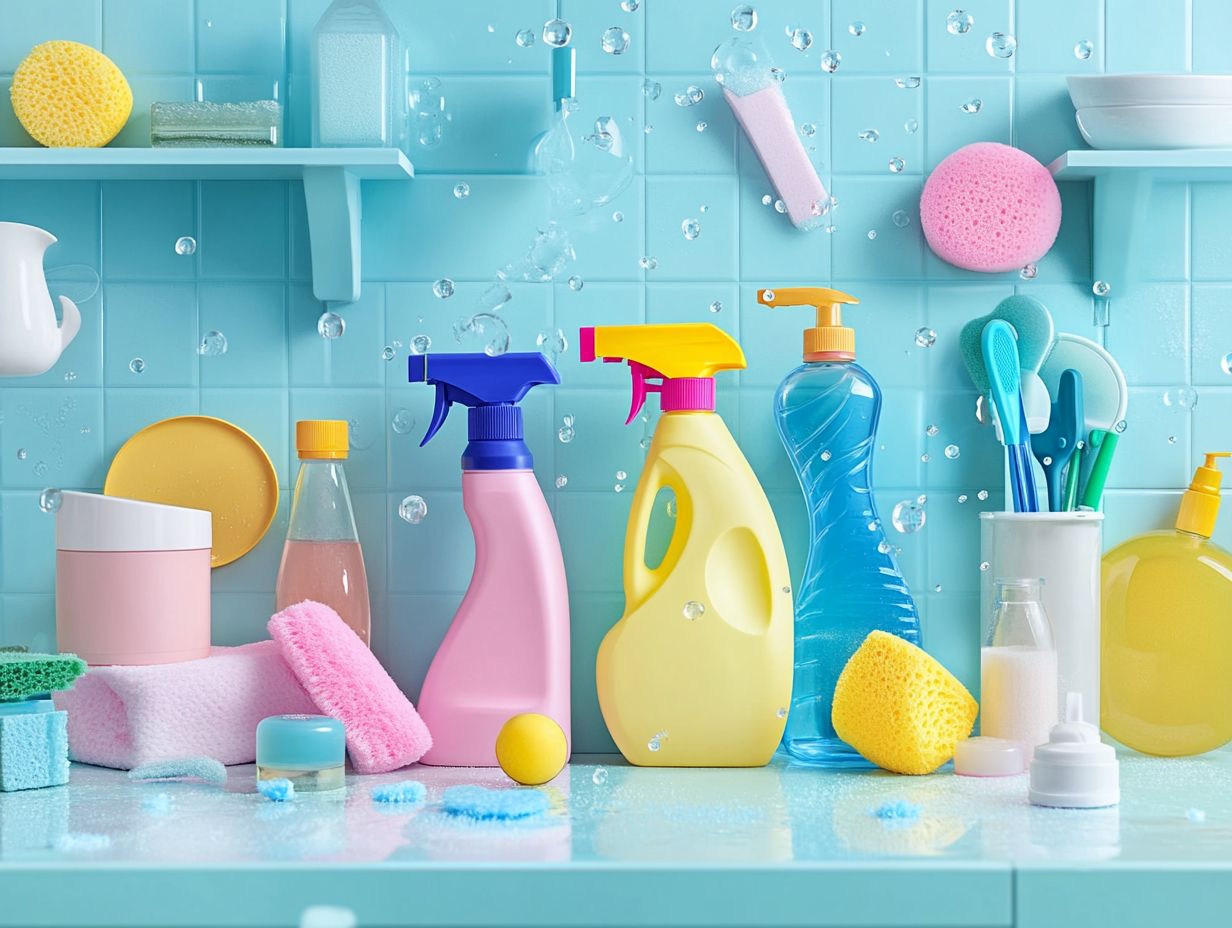
One prevalent myth about DIY cleaning is that it doesn t measure up to commercial cleaners. This misconception stems from the belief that only strong chemicals, like bleach, can tackle mold or stubborn stains effectively. However, many people have found that DIY cleaning solutions, especially those with vinegar and baking soda, can handle these challenges while being gentler on the environment and your loved ones.
For example, vinegar acts as a natural cleaning solution made from natural ingredients that kill germs and can break down grime and eliminate odors, making it perfect for your kitchens and bathrooms. Baking soda excels at scrubbing surfaces and neutralizing unwanted smells, delivering a formidable punch against pesky stains. Using vinegar to clean is effective and safe for your home.
Consider a simple blend of vinegar and baking soda; this combination can effectively banish mold from your bathroom tiles and grout. Homemade remedies can hold their own against commercial products. By adopting these natural cleaning alternatives, you can effortlessly keep your home sparkling clean without harsh chemicals, demonstrating the undeniable effectiveness of DIY approaches!
2. DIY Cleaning Is Time-Consuming
Another myth surrounding DIY cleaning is that it s a labor-intensive endeavor that requires significant time to create effective solutions. While some may think that whipping up a homemade cleaner takes forever, the truth is that many recipes can be prepared in just minutes using simple ingredients like vinegar and baking soda.
Numerous time-saving DIY cleaning hacks streamline the process and can prove to be more efficient than traditional cleaning methods. For instance, using microfiber cloths soft, reusable cloths that trap dust and dirt can speed up your cleaning significantly.
With just a few minutes of preparation, you can create powerful cleaners that tackle stubborn stains and grime. A blend of lemon juice and salt works wonders for removing tarnish from metal, while mixing water and essential oils can effectively deodorize various spaces. You can also use coffee grounds to naturally eliminate odors in your kitchen.
These methods not only save you time but also allow you to customize your cleaning solutions according to your personal preferences and specific needs. By embracing these effective DIY solutions, you can simplify your cleaning routine without feeling overwhelmed. Why not give these natural cleaning solutions a try today? You might be surprised by how effective they are!
3. DIY Cleaning Is Not Safe
Many believe that DIY cleaning solutions are safe to use and often involve less exposure to harmful chemicals compared to commercial cleaners.
The belief that DIY cleaning is unsafe often arises from the misconception that homemade products can also be harmful as some commercial cleaners laden with toxic chemicals. In reality, many DIY cleaning solutions use natural ingredients. These are safer for children and pets while effectively tackling dirt and odors.
Common cleaning myths like these deter people from trying effective DIY methods. By choosing green products and safe ingredients, you can ensure your cleaning practices are not only effective but also healthy. For example, vinegar cleans effectively without the need for harsh chemicals.
Using natural-based solutions minimizes the risk of toxic exposure and fosters a healthier indoor environment. Common ingredients like vinegar, baking soda, and essential oils pack a powerful punch in terms of cleaning ability, all without the adverse effects usually linked to synthetic alternatives.
By incorporating these methods into your routine, including using newspapers for cleaning windows and microfiber cloths for dusting, you can confidently maintain a clean home free from harsh chemicals. Embracing these practices also encourages a sustainable lifestyle that prioritizes the safety and well-being of everyone in your household.
Notably, Carolyn Fort from the Good Housekeeping Institute has highlighted the benefits of such green cleaning practices.
4. DIY Cleaning Is Only For Small Messes
A prevalent myth surrounding DIY cleaning is the notion that it’s only effective for small messes or minor tasks. Many individuals assume that significant cleaning challenges, such as mold removal or deep cleaning, necessitate the use of powerful commercial products like bleach.
However, you’ll find that effective DIY solutions can address a wide array of cleaning challenges, demonstrating that homemade cleaners can be just as formidable as their store-bought counterparts, including using air fresheners to eliminate odors. These cleaning solutions are remarkably versatile, capable of tackling everything from grease stains in the kitchen to stubborn grime on bathroom tiles.
By using easily accessible ingredients like vinegar, baking soda, and lemon, you can make effective mixtures that deliver thorough cleaning while fostering a healthier home environment by steering clear of harsh chemicals. For example, vinegar cleans and polishes wood effectively, debunking the myth that more detergent means cleaner surfaces.
Whether you’re on a mission to refresh carpets or sanitize surfaces, the adaptability of these effective DIY cleaning concoctions ensures that they rise to the occasion. Using Castile soap, a plant-based soap that is gentle on surfaces, enhances cleaning power while being safe to use around the home.
What Are The Benefits Of DIY Cleaning?
The benefits of DIY cleaning go well beyond mere cost savings; they encompass elements that foster a healthier and more sustainable lifestyle. Using coffee grounds as a sink deodorizer is an excellent way to repurpose waste.
By crafting your own cleaning products at home, you can steer clear of the harsh chemicals typically found in commercial cleaners. This creates a safer environment for your family and pets, aligning with the principles of Kings Cleaning Co and promoting eco-friendly cleaning practices.
Moreover, DIY cleaning enables you to customize your cleaning solutions according to your personal preferences and needs. This showcases the versatility and effectiveness of homemade products in achieving an impeccable level of cleanliness and hygiene.
Start exploring DIY cleaning today and enjoy a cleaner, healthier home!
1. Avoid Harsh Chemicals
One of the primary benefits of DIY cleaning is your ability to bypass those harsh chemicals often found in commercial cleaning products. By leveraging natural ingredients like vinegar, baking soda, and essential oils, you can craft effective DIY solutions that are safe to use and environmentally friendly. You don’t need bleach when hairspray removes ink stains effectively.
This transition away from toxic substances fosters a healthier home atmosphere, significantly reducing the risk of negative health impacts for both your family and pets. Good housekeeping habits, such as regular maintenance of dishwashers and washing machines, can further enhance the effectiveness of your green cleaning regimen.
Microfiber cloths help you clean without spreading dust around like feather dusters. When you choose green products, you minimize your environmental footprint while still achieving that pristine cleanliness. Consider ingredients like lemon juice and Castile soap; they are not just powerful cleaning agents but also biodegradable, making them a responsible choice for anyone mindful of their ecological impact.
In the long run, using all green products ensures a sustainable approach to maintaining a clean home. By integrating these natural alternatives into your everyday cleaning routines, you can keep your home fresh without compromising indoor air quality or contributing to pollution. Embracing DIY cleaning practices is a meaningful step toward a sustainable lifestyle, promoting both your well-being and a commitment to caring for our planet.
2. Personalize Your Cleaning Products
One of the most significant advantages of DIY cleaning is the ability to personalize your cleaning products to suit your unique preferences and needs. Unlike commercial cleaners, which often come with predetermined formulas and artificial scents, DIY solutions can be customized with ingredients like essential oils, allowing you to create a cleaning experience that resonates with your tastes. This level of customization elevates the cleaning process and ensures that the products you use are safe for children and pets.
The flexibility of DIY cleaning enables you to experiment with various natural ingredients, such as vinegar, baking soda, and lemon juice, each bringing unique cleaning properties to the table. For instance, you might choose invigorating citrus scents for a refreshing atmosphere or calming lavender to make your cleaning routine more enjoyable.
By blending effective DIY techniques with your personal preferences, you can achieve a spotless home without sacrificing safety or environmental considerations. This makes the cleaning experience more gratifying and perfectly tailored to your individual lifestyle.
3. Save Money
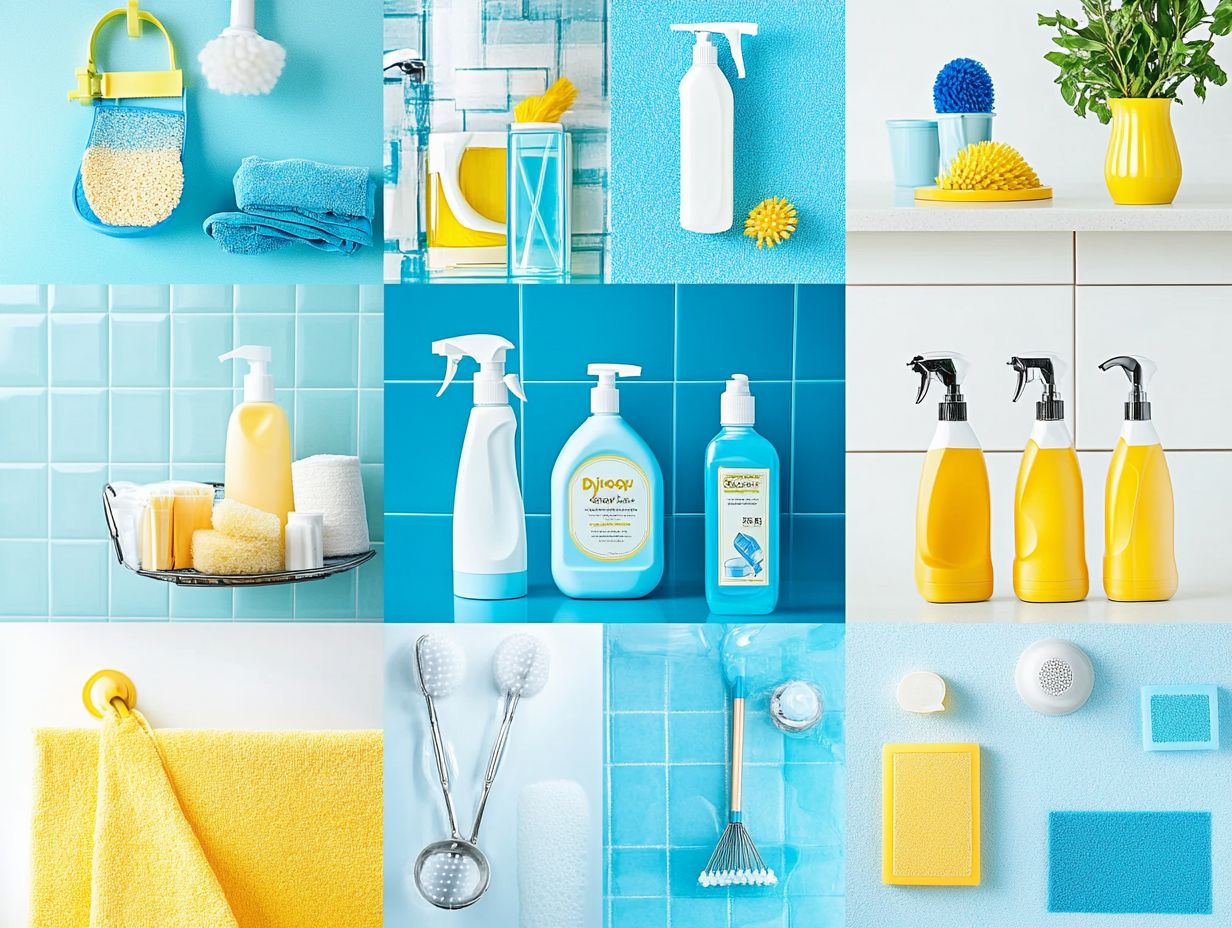
Embracing DIY cleaning is a savvy way to save money, especially since crafting your own cleaning products is often more economical than buying commercial ones. With affordable ingredients like vinegar and baking soda, you can easily create effective cleaning solutions that significantly lower your household cleaning expenses in the long run. By investing in these basic ingredients, you can keep your home spotless without straining your wallet.
This approach fosters a budget-friendly way to maintain a clean home while cultivating a deeper awareness of what goes into the products you use. In contrast to the rising prices of store-bought cleaners often presented in flashy packaging and laden with potentially harmful chemicals DIY options allow you to tailor solutions to your specific needs while ensuring safety.
By opting to make your own cleaning solutions, you not only save money but also gain the satisfaction of crafting powerful, environmentally friendly formulas that tackle grime effectively. Over time, these savings add up, providing you with greater flexibility in your household budget for other essential needs.
4. Reduce Waste
Another advantage of DIY cleaning lies in its ability to reduce waste. Crafting your own cleaning products means using fewer plastic containers and packaging materials. By choosing bulk ingredients and reusable containers, you can significantly minimize your environmental footprint while enjoying the benefits of effective DIY cleaning solutions. This eco-friendly approach aligns with sustainable principles and supports a greener lifestyle.
DIY cleaning enables you to select natural, non-toxic ingredients instead of relying on commercial products that often come wrapped in single-use packaging. By sourcing ingredients from local suppliers or utilizing what you already have in your pantry, you diminish your dependence on harmful chemicals and cut down on the emissions associated with store-bought items.
Embracing green products contributes to a healthier indoor environment and nurtures a sense of responsibility for the planet. Your self-made cleaning solutions become an essential component of a mindful consumer lifestyle.
How To Create Effective DIY Cleaning Products?
Start your DIY cleaning journey by exploring the right ingredients. This careful research ensures they are both effective and safe. You ll find that ingredients like vinegar, baking soda, and hydrogen peroxide can be remarkably powerful when mixed correctly.
By adhering to established recipes and storing your solutions properly, you can maximize the benefits of your DIY cleaning endeavors, ensuring that your homemade products effectively meet your cleaning needs.
1. Research Ingredients
Understanding ingredients is crucial for crafting effective DIY cleaning solutions. Take vinegar, for instance it s celebrated for its natural disinfectant qualities. Essential oils not only provide delightful aromas but also bring additional cleaning benefits. By carefully selecting the right combination of ingredients, you can create tailored solutions that meet your specific needs. Don’t forget to remove mold effectively using these natural ingredients.
Hydrogen peroxide, a common household disinfectant, can also be effective for disinfecting and whitening surfaces. With this knowledge, you’ll be equipped to tackle various cleaning challenges, whether you’re dealing with stubborn grime or unpleasant odors.
Consider baking soda; it serves as a gentle abrasive and deodorizer, making it ideal for scrubbing surfaces without leaving scratches. Lemon juice not only infuses a fresh scent but also boasts antimicrobial properties that amplify the cleaning power of any concoction. DIY options like these show that products equally powerful as commercial cleaners can be made at home.
By thoughtfully researching and experimenting with these ingredients, you can develop cleaning products that are environmentally friendly and impressively effective resulting in a cleaner, more inviting home. For instance, vinegar cleans effectively when used properly, and coffee grounds can act as a natural sink deodorizer.
Start making your own cleaning products today for a healthier home and a happier planet!
2. Follow Recipes with Green Products
Following established recipes with green products is crucial for crafting effective DIY cleaning solutions that yield desired results. Many trusted formulas combine ingredients like vinegar and baking soda to tackle various cleaning challenges, from surface cleaning to stain removal. By sticking to these recipes, you ensure that your homemade solutions are effective and safe for use around your loved ones.
For instance, a simple mixture of equal parts water and vinegar works wonders on glass surfaces, leaving them beautifully streak-free. Blending baking soda with hydrogen peroxide creates a powerful paste ideal for stubborn grout stains. These combinations help maintain a clean home and provide an eco-friendly alternative to commercial cleaning products. Hairspray effectively removes stains from fabric, while adding essential oils provides a pleasant scent and additional cleaning power.
When whipping up your DIY solutions, accurately measure your ingredients and follow instructions meticulously. This approach helps you achieve the best results and avoids unwanted reactions. Using more detergent doesn’t always mean cleaner results, so always follow the instructions. Carolyn Fort from the Good Housekeeping Institute recommends using microfiber cloths for most surfaces.
3. Store Properly
Proper storage of your DIY cleaning products is essential for maintaining their effectiveness and ensuring safety during use. Homemade cleaning solutions should be kept in labeled containers, preferably made of glass or sturdy plastic, and stored away from direct sunlight and heat sources. These simple precautions guarantee that your effective cleaning solutions remain safe and reliable over time. Bleach, a common ingredient, needs careful storage to prevent accidents.
Ensure the containers are tightly sealed to prevent contamination or evaporation of key ingredients, as this could compromise the integrity of your cleaning solutions. Stash these products in cool, dry locations, like cupboards or closets, to create ideal storage conditions. Adding air fresheners and essential oils can eliminate odors and keep your storage areas smelling fresh.
Regularly check expiration dates and replace any expired mixtures to enhance safety. If you have young children at home, consider installing child-proof locks on storage areas to reinforce your commitment to safety while enjoying the benefits of your effective cleaning solutions. Using Castile soap in your DIY cleaning products is a safe and gentle option for households with kids.
4. Test On Small Area First
Before you dive into applying that DIY cleaning concoction across a larger area, it’s wise to conduct a little experiment on a small, inconspicuous spot. Testing the solution ensures both safety and effectiveness, allowing you to sidestep unwanted surprises on your surfaces while confirming that your cleaning solution delivers the desired results. Starting with a small area lets you use your homemade products with confidence, protecting your belongings from potential damage. Remember, bleach is effective in removing mold but should be tested on a small area first.
This initial test reassures you that the cleaning solution is not just safe but also effective, which is vital for any cleaning routine. Different surfaces can react unpredictably to various ingredients, making this simple practice essential for anyone looking to elevate their cleaning game with DIY methods. Testing on a small area first helps ensure that your cleaning solution won’t damage surfaces.
Taking a moment to conduct this test enables you to spot potential issues ahead of time, ensuring your cleaning efforts lead to successful outcomes without unexpected misadventures. Adopting this approach opens the door to a sparkling clean environment while keeping the integrity of your surfaces intact. To polish wood, use simple ingredients like olive oil and vinegar for a safe and beautiful shine.
Frequently Asked Questions
- What are common myths about DIY cleaning?
- Many believe that all natural products are safe and effective, but it’s important to test and understand each ingredient.
- How can I make my DIY cleaning solutions more effective?
- Follow established recipes and measure ingredients accurately for the best results.
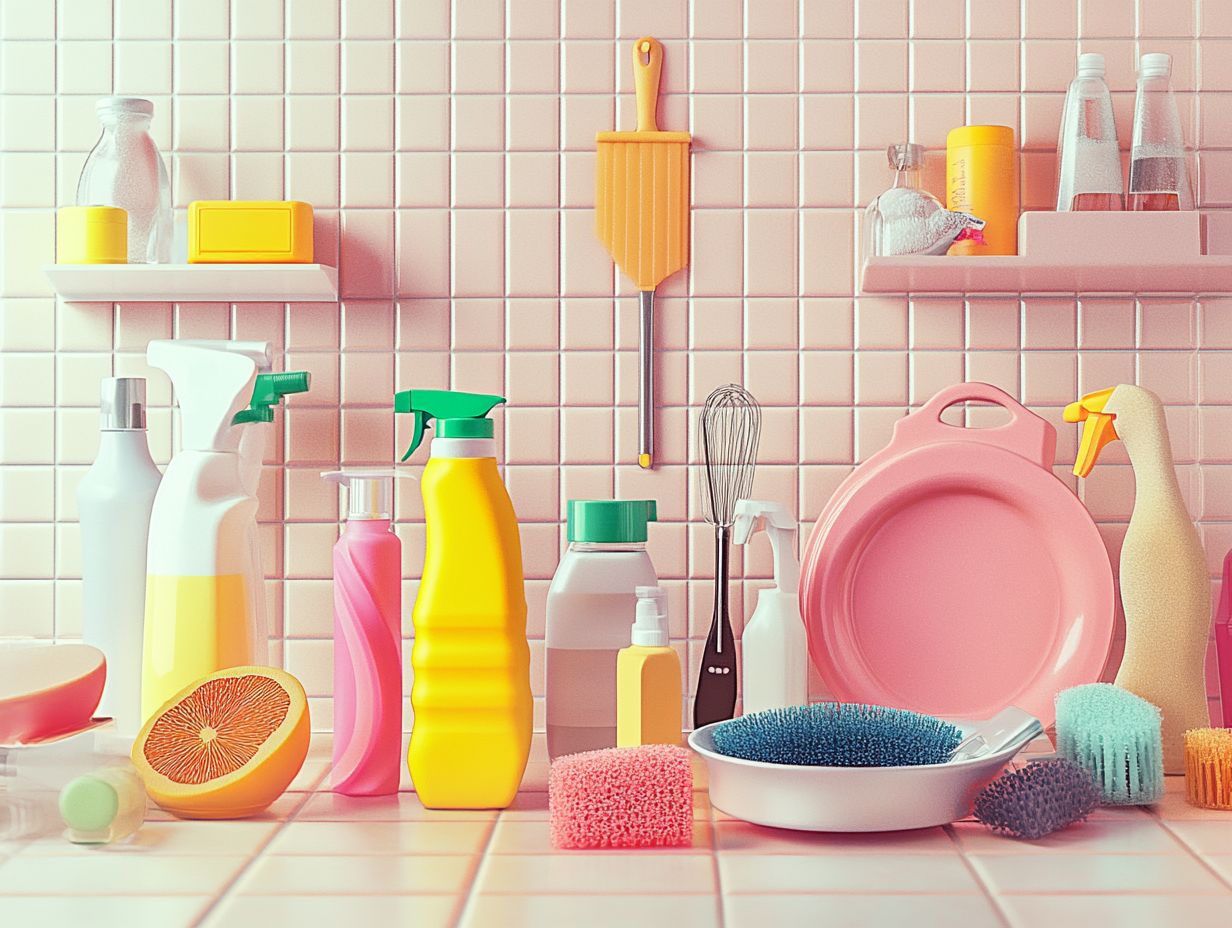
Try making your own DIY cleaning solutions today! Share your experiences and let us know how they worked for you!
What are the myths about DIY cleaning?
Some common myths about DIY cleaning include the beliefs that it is always cheaper, that natural ingredients are always better, and that it is safe to mix different cleaning products together. While DIY methods can be great for some tasks, they are not always the best way to achieve professional-level results.
Is DIY cleaning always cheaper?
Not necessarily. While some DIY cleaning solutions may be cheaper, others may require expensive or hard-to-find ingredients. Additionally, if the DIY solution does not work effectively, it may end up costing more in the long run. Using newspapers can be an effective and inexpensive method for cleaning windows.
Are natural ingredients always better for cleaning?
No, not always. While natural ingredients may be safer for the environment, they may not be as effective at removing tough stains or disinfecting surfaces. It’s important to research and carefully choose the right ingredients for the cleaning task. For instance, using more detergent doesn’t always mean cleaner dishes when using dishwashers.
Is it safe to mix different cleaning products together?
No, it is not safe to mix different cleaning products together. Mixing certain chemicals can create toxic fumes or reactions that can be harmful to your health. Always follow the instructions and warnings on cleaning product labels. For example, mixing bleach and vinegar can produce dangerous fumes.
Can DIY cleaning solutions replace professional cleaning services?
DIY cleaning solutions may work well for regular maintenance and light cleaning tasks, but they may not completely replace the deep cleaning and specialized services provided by professional cleaning companies. Kings Cleaning Co recommends using professional services for tasks that require industrial-grade cleaning, such as deep cleaning carpets or removing mold.
Are there any risks associated with DIY cleaning?
Yes, there can be risks associated with DIY cleaning, such as using the wrong type of cleaner for a surface, not properly diluting ingredients, or not wearing protective gear. It’s important to research and follow proper safety precautions when attempting DIY cleaning methods. Feather dusters are excellent for removing dust from delicate surfaces without scratching them.

